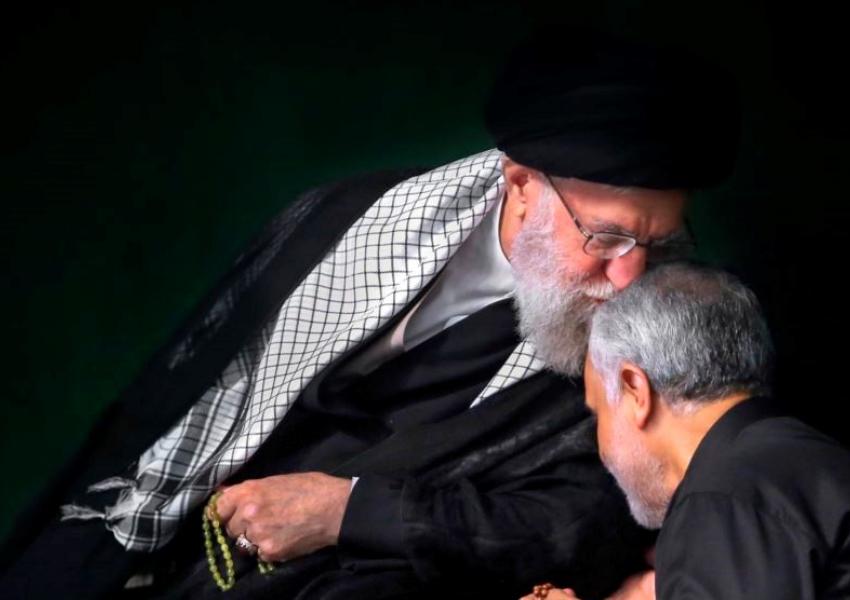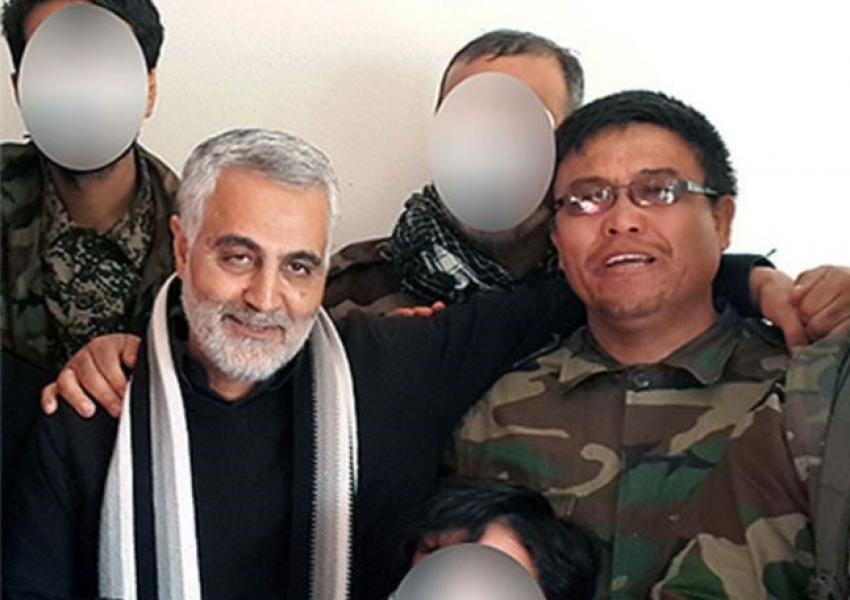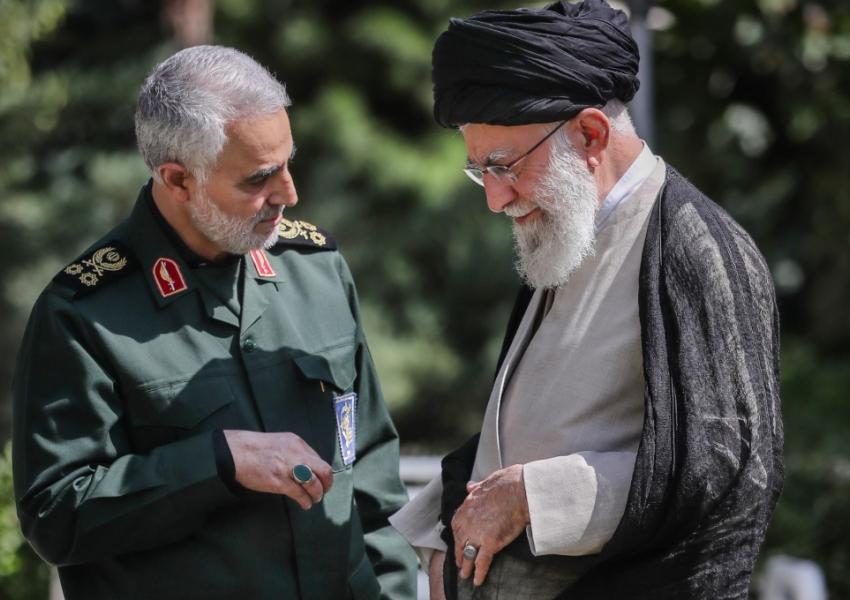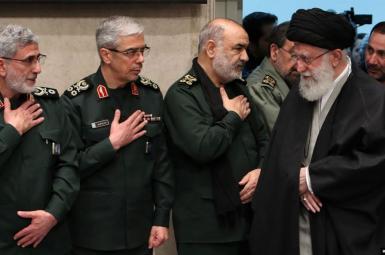
One Year Without Soleimani – A Weaker Islamic Republic
Opinion-Analysis
Qasem Soleimani’s death one year ago has had significant consequences for the Islamic Republic, its leader Ali Khamenei, the Revolutionary Guards and its Qods Force, Iran’s proxy forces in the region and for the Middle East, and in general it has weakened the regime in Iran.
The death of the commander of proxy forces
Soleimani was the chief commander of Iran’s proxy forces in the Middle East. He directly commanded the Hashd al-Shaabi and its multitude of Shiite militia groups in Iraq, the Hezbollah in Lebanon, Houthis in Yemen, Afghan and Pakistani militias fighting in Syria (Fatemiyoun and Zainabiyoun) and to an extent the Palestinian Hamas and Islamic Jihad.
These groups are the Islamic Republic’s muscle against adversaries in all the regional countries where they are based and its tools for expanding influence. Soleimani was not only the commander of these groups but the founder of some of them, such as the Iraqi militias and the Afghan fighting units. He was also the architect who linked all the proxy forces and coordinated them as a network for advancing the Islamic Republic’s strategic goals. After his death, the successor Esmail Ghaani has been unable to fully play Soleimani’s role as the glue that bounded these forces.

Soleimani with Alireza Tivasoli (R), commander of the Afghan Fatemiyoun Brigade, who was killed fighting in Syria
Soleimani, Iran’s key player in the Middle East
The general killed by a US airstrike on January 3, 2020 in Baghdad was also Iran’s chief diplomat in the region, far more powerful than the foreign minister. This commanding position was due to the personal and special trust Khamenei had in Soleimani. Ghaani has not been able to play such a role.
One good example is Mustafa Al-Kadhimi becoming Iraq’s prime minister after Soleimani’s death. Kadhimi is more independent from Iran than his predecessors. While Soleimani exercised far stronger influence in Iraqi politics, his successor Ghaani failed to control events and allowed a person opposed to Iran-backed Shiite groups to become prime minister.
There are signs of less activism by the Qods (Quds) force also in Syria, the Gaza Strip, and even in Yemen. Ghaani simply does not have the personal influence and energy Soleimani had, while Soleimani’s killing has reduced Ghaani’s ability to move around and show his presence in the region.
More aggressive US strategy against Qods and its proxy forces
Soleimani’s killing was a sign of a more aggressive US strategy against the Islamic Republic, the IRGC and the Qods, a development limiting Iran’s activities in the region. The Trump administration demonstrated a different approach toward Iran from the Obama team. While President Barack Obama reportedly decided not to kill Soleimani on several occasions, Trump eliminated him.
The Trump administration’s approach was also different in the Persian Gulf regarding tensions between the US Navy and Iranian speedboats. Trump warned Iran early on that he will not tolerate the past harassments of US vessels. Of course, it still tried to flex its muscles by shooting down a US drone and a missile attack on US bases in Iraq five days after Soleimani’s killing, but that was done after indirect warnings of the impending action in which no American serviceman was killed. As a response to Soleimani’s killing, the missile attack fell short of being the strong retaliation widely expected. The US killed the most important Iranian general and the most important Iraqi militia leader, Abu Mahdi al-Muhandis, and got away with it.

The death of the irreplaceable general
Soleimani was the most important IRGC general when he was killed. Although he was not the IRGC chief commander, both within the IRGC and in the wider Iranian public he imposed himself as more influential. Bagher Zolghadr, former deputy commander of the Revolutionary Guards in a television discussion recently said that the IRGC simply provided support and logistics to the Qods Force, and that and its operational commander in practice was Khamenei.
Soleimani enjoyed a close personal relationship with Khamenei that no other commander or official, including Ghaani, could match. Vice President Es’haq Jahangiri recently confirmed that only Soleimani had such a special close relationship with Khamenei.
Supporters of the Islamic Republic knew very well that Soleimani was more influential than all other commanders and he was being mentioned even as a presidential candidate. Ghaani obviously does not enjoy such a stature and he is not even the most important military figure. This leaves no doubt that the IRGC are weaker without Soleimani.
The Islamic Republic Without Soleimani
The regime in Iran has based its confrontation with rivals and adversaries on two pillars: Proxy forces and its missile arsenal. Soleimani headed one of these pillars and his demise was a serious blow to one of the two strategic tools.
Although the Islamic Republic claims its system is not dependent on individuals, there is no doubt that Soleimani’s death weakened the regime internally and in the region. Many supporters both in Iran and beyond its borders see that Iran has been unable to make an appropriate response to Soleimani’s killing. Although it threatens a harsh retaliation, its motto lately is to “expel” the United States from the region – a tall tale that can keep supporters waiting for a long time.
Khamenei knows that any military conflict with the US could escalate and end up with the downfall of the Islamic Republic, already facing economic crisis and the specter of nationwide revolt. Khamenei and the IRGC prefer to postpone Soleimani’s revenge to a distant future.
Adversaries are aware of the impact of Soleimani’s death and are happy about it. Everyone, including supporters of the Islamic Republic, knows his absence has important consequences.









